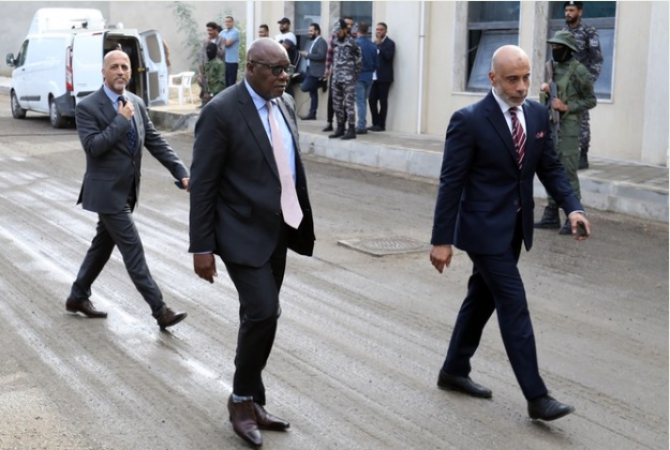
TRIPOLI: The newly appointed UN representative in Libya had hoped to expedite long-delayed elections, but his plan has met with resistance from the east-based parliament and a muted response from his rivals in Tripoli.
Abdoulaye Bathily, a Senegalese diplomat, informed the UN Security Council last month that he intends to set up a committee to oversee the conduct of presidential and legislative elections in Libya later this year.
However, his direct criticism of the two houses of parliament in the North African nation for failing to reach an agreement on a legal framework for the elections threatens to sabotage Batholi's plans.
Also Read: UN warns of aid reductions due to Taliban's suppression of women's rights
Khalid al-Montasser, a professor of international relations at the University of Tripoli, said the pushback was "predictable" because members of both houses could lose their seats in the election.
Despite their rivalry, both see the UN initiative as "an attempt to impose international will on Libya" and "interfering with their sovereign decision-making power," Montresor told AFP.
Since the 2011 uprising that overthrew dictator Muammar Qaddafi, Libya has experienced more than ten years of intermittent conflict, with several rival militias, foreign powers and multiple governments vying for influence.
The nation is still divided between a so-called interim government in the west's capital, Tripoli, and one in the east, apparently backed by military leader Khalifa Haftar.
Even though most observers agree that Libyans strongly support the elections, bitter disputes over the legal propriety of holding them have been a major issue since the most recent significant conflict between Haftar and western Libyan forces in 2020 Is.
Also Read: Bakhmut may soon fall to Russian invaders the NATO chief warns
The country's House of Representatives, which is based in the east, last month passed an amendment to its interim constitution that it claimed would give the elections a legal basis.
Bathali, who was named head of the UN mission in Libya UNSMIL in October, claimed the amendment was "controversial" among Libyans and lacked clarity on important matters such as who can run for president.
He also pointed out that the High Council of State, the upper house of parliament with its headquarters in Tripoli, had not approved it.
Bathley was criticized by the House for "double standards" and a "lack of objectivity".
According to Libyan analyst Abdullah al-Rayz, the UN envoy's initiative aims to put pressure on competing Libyan factions by giving them one last chance "before there is a vote without them".
He claimed that the two chambers specialize in time-wasting and political horse-trading and that the international community wanted to humiliate them.
The transitional government of Abdelhamid Dabibah, based in Tripoli, has expressed willingness to support Bathali's plan and has asked the United Nations to provide logistical support to that end.
The UN resolution would build on the progress made between the two chambers on "a legal basis for elections", the US embassy said in an online post last week, "calling on Libya's key leaders to plan in a constructive spirit." This scheme also has the support of Britain.
"The Libyan people deserve certainty and confidence in their institutions," its mission to the United Nations in New York tweeted shortly after Bathali spoke at the Security Council.
"Everyone must agree to the terms of the election, and the results must be respected. But Montasar insisted that US and UK support was "not enough," highlighting the need for support from his arch-rival Russia, which has Troops are deployed. Southern Libya through the Wagner paramilitary group, which is linked to the Kremlin. Moscow is a key player in Libya and has influence over Haftar, the speaker claimed.
Also Read: Islamic leaders condemn the Taliban's actions and media representations of Muslim women
The impasse over the legitimacy of the elections has been caused mainly by efforts to block Haftar, a US citizen from western Libya, from running for president.
Haftar's rivals want rules that bar dual citizens and military personnel from running for office. In a recent speech, Dabibah summed up the concerns of many in western Libya. He declared that going back to a military system was not acceptable.